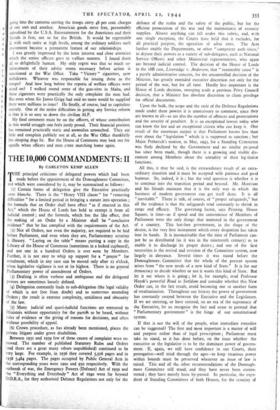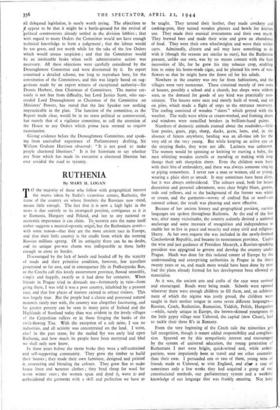THE 10,000 COMMANDMENTS: II
By CARLETON KEMP ALLEN (1) Certain forms of delegation give the Executive practically carte blanche. There is the "Henry VIII clause" for "removing difficulties " for a limited period in bringing a statute into operation ; the formula that an Order shall have effect " as if enacted in this Act," which the House of Lords has held to exempt it from all judicial control ; and the formula, which has the like effect, that the making of an Order by a Minister shall be " conclusive evidence" that he has complied with the requirements of the Act.
(2) Not all Orders, nor even the majority, are required to be laid before Parliament, and even when they are, Parliamentary scrutiny is illusory. "Laying on the table" means putting a copy in the Library of the House of Commons (sometimes in a locked cupboard), and not one in a hundred Orders is ever sseen by Members. Further, it is not easy to whip up support for a " prayer" for annulment, which in any case can be moved only after ir o'clock, when legislative vigilance is not at its highest. There is no general Parliamentary power of amendment of Orders.
(3) Drafting is often verbose and ambiguous and the delegated powers are sometimes loosely defined.
(4) Delegation constantly leads to sub-delegation (the legal validity of which is not free from doubt) and to numerous amending Orders ; the result is extreme complexity, untidiness and obscurity of the law.
(5) Many judicial and quasi-judicial functions are entrusted to Ministers without opportunity for the partie§ to be heard, without rules of evidence or the giving of reasons for decisions, and often without possibility of appeal.
(6) Crown procedure, as has already been mentioned, places the private litigant under grave disabilities.
Between 1931 and 1939 few of these causes of complaint were re- moved. The number of published Statutory Rules and Orders and there are a great many others unpublished) continued to be very large. For example, in 1936 they covered 5,516 pages and in 1938 5,484 pages. The pages occupied by Public General Acts in The corresponding years were i9oo and 95o respectively. With the outbreak of war, the Emergency Powers (Defence) Act of 1939 and 'he "Everything and Everybody" Act of 1940 went far beyond D.O.R.A., for they authorised Defence Regulations not only for the
defence of the realm and the safety of the public, but for the efficient prosecution of the war and the maintenance of essential supplies. Almost anything can fall under this rubric, and, with one single exception, the Courts have held that it excludes, for
all practical purpose, the operation of ultra tires. The Acts
further enable the Departments, or other " competent auth rities," to depute their powers to a variety of sub-delegates, such as National Service • Officers and other Ministerial representatives, who again are beyond judicial control. The decision of the House of Lords in the 18B case, Liversidge v. Anderson, that "reasonable cause " is a purely administrative concern, for the uncontrolled decision of the Minister, has greatly extended executive discretion not only for the period of the war, but for all time. Hardly less important is the House of Lords decision, sweeping aside a previous Privy Council decision, that a Minister has absolute discretion to claim privilege for official documents.
Upon the bulk, the scope and the style of the Defence Regulations made under these powers it is unnecessary to comment, since they are known to all—as are also the number of offences and prosecutions and the severity of penaltieS. It is an exceptional lawyer today who can know the law and an exceptional citizen who can keep it. One result of the enormous output is that Parliament knows less than ever about the " legislation " which it is supposed to sanction ; but Major Petherick's motion, in May, 1943, for a Standing Committee was flatly declined by the Government and no similar proposal has since been made, though there is a growing and visible dis- content among Members about the unreality of their legislative functions.
All this, it rnay be said, is the extraordinary result of an extra- ordinary situation and it must be accepted with patience and good humour. So, indeed, it is ; but the vital question is whether it is to continue into the transition period and beyond. Mr. Morrison and his friends maintain that it is the only way in which the business of modern government can get itself done. It is all " inevitable." There is talk, of course, of " proper safeguards," but all the evidence is that the safeguards tend constantly to shrink in range and efficacy. The governing factor, says Printing House Square, is time—as if speed and the convenience of Members of Parliament were the only things that mattered in the government of a country. This hot-foot government, in the shape of the decree, is the very first instrument which every despotism has taken into its hands. It is inconceivable that the time of Parliament can- not be so distributed (as it was in the nineteenth century) as to enable it to discharge its proper duties ; and one of the first necessities is the revival and revision of the Committee system, now
largely in abeyance. Several times it was stated before the Donoughmore. Committee that the whole of the present system arises from " the new needs of a new kind of State." It is for our democracy to decide whether or not it wants this kind of State. But let it see where it is going ; let it, for example, read Professor Hayek's powerful Road to Serfdom and consider whether this New Order can, in the last result, avoid becoming one or another form of totalitarianism. Throughout our history the power of government has constantly swayed between the Executive and the Legislature. If we are entering, or have entered, on an era of the supremacy of the Executive, let us recognise the fact and cease to pretend that " Parliamentary government " is the hinge of our constitutional system.
If that is not the will of the people, what immediate remedies can be suggested? The first and most important is a matter of will and purpose rather than of legal prescription ; Parliament must take its stand, as it has done before, on the issue whether the executive or the legislative is to be the dominant power of govern- ment. • If, again, we still have confidence in our Courts, their prerogative—well tried through the ages—to keep vicarious power within bounds must be preserved whenever an issue of law is raised. This and all the other recommendations of the Donough- more Committee still stand, and they have never been contro- verted ; they have merely been by-passcd. In particular, the expe- dient of Standing Committees of both Houses, for the scrutiny of all delegated legislation, is surely worth trying. The objections to # appear to be that it might be a battle-ground for the revival of political controversies already settled in the division lobbies ; that with regard to many Orders the Committee would not have enough technical knowledge to form a judgement ; that the labour would be too great, and not worth while for the sake of the few Orders which would arouse suspicion ; and that the Committee would be an intolerable brake when swift administrative action was necessary. All these objections were carefully considered by the Donoughmore Committee and were discounted by it. Its report contained a detailed scheme, too long to reproduce here, for the constitution of the Committees, and this was largely based on sug- gestions made by an expert witness of exceptional authority—Sir Dennis Herbert, then Chairman of Committees. The matter cer- tainly is not free from difficulty, but Lord Justice Scott, who suc- ceeded Lord Donoughmore as Chairman of the Committee on Ministers' Powers, has stated that the late Speaker saw nothing impracticable in the plan. The function of the committee, as the Report made clear, would be in no sense political or controversial, but merely that of a vigilance committee, to call the attention of the House to any Orders which prima fade seemed to require examination.
Giving' evidence before the Donoughmore Committee, and speak- ing from unrivalled experience of Parliamentary drafting, Sir William Graham Harrison observed: ".It is not good to make people chartered libertines." It is for historians to say whether any State which has made its executive a chartered libertine has. ever avoided the road to tyranny.



























 Previous page
Previous page